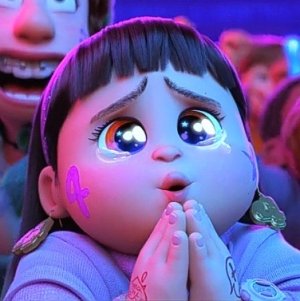
For me, Miki Honoka as Aihara Kotoko is perfect. I haven't read the manga but I think that she has a fair amount of innocence, of "stupidity" of naiveness and a perfect image of a girl in love. Her acting isn't that exaggerated and annoying just because she isn't smart. And I actually think that Honoka being young is perfect since it started in high school and all the way to college. Of course there are times that Honoka looks like a 12-year-old girl but she clearly has this aura of a bubbly, care-free and determined Kotoko that I imagined.
Yuki Furukawa is the real life Naoki Irie. Yes, he does lack expression at times but I think that perfectly captures Naoki's I-don't-give-fuck / "boring life" attitude. I think that compared to the others, he embodies that cold demeanor well. He doesn't just look good, he looks smart and it actually helps that Furukawa speaks English fluently as it makes it REALLY smart.
I know that some would say that Furukawa and Honoka look like brothers and sisters because of the obvious height difference and I beg to disagree. The fact that Furukawa is actually 26 and Honoka is 16, that's 10 year age difference yet it wasn't THAT evident in the drama. Furukawa looks young. And in fact, it looks like a bittersweet high school love story to a blossoming hate-love college love story. I find the height difference cute because it makes Honoka seem vulnerable yet it contrasts with her personality and Furukuwa can make her feel safe especially when he hugs her. (Though Honoka being 16 and already having romantic scenes...)
Still, the characters are far from perfect. Naoki is like a jerk who keeps Kotoko at arm's length because he knows she's madly in love with him. And Kin-chan is the typical second male lead that's a good guy and madly in love with the girl but gets friendzoned even if he deserves better. But it's an interesting love story of how a cold and smart guy (who hates dumb girls) falls in love with one showing that lack of IQ does not equal to stupidity, personality matters too.
What I love the most about the plot (it's very typical shoujo) it really the time span. I love that it started in high school, graduation and extending all the way to college. It makes a cohesive and unity plot that ties everything together. Every character here compliments each other and the actors have great chemistry, be it Jinko and Satomi (Kotoko's best friend) or Kotoko or Mrs. Irie. Of course, it's also a very hilarious drama and not much drama OR that cliche complicated family background. THANK GOODNESS. If there's anything cliche it's the romance. But still, I love how it takes its time. It actually a slow progress, making it more believable especially with the change of Naoki's view on Kotoko.
Was this review helpful to you?

Kudos for the wonderful technicalities and truly recreating the real Hashima Island. As with Ryoo's works, the action scenes are impressive—particularly that of So's public bath sequence.
It's a great ensemble, spanning different generations. Hwang's obviously a veteran, one of South Korean's highest paid actions, So, a prominent drama and film actor, Song, one of the nation's sought-after Oppa, Lee, a prominent actress/singer in East Asia and Kim, a rising young actress. It's a dream cast. But the cast can only do so much.
An intriguing premise despite its nationalistic approach. But there's always been this redundancy that seems to spur out of these narratives that are set during the Japanese occupation—we've seen it in Age of Shadows, The Handmaiden, Assassination. Of course, each of these films take a different approach but it also makes me say—again?
Battleship Island lacks...depth and tension. Sure, it had its moments like So's action sequence but it just doesn't have that same spice as say, Age of Shadowswhose 30 minute train sequence moves the story AND character forward. Battleship's characters felt flat. And those with some substance—didn't make it to the end. To me, it felt too dramaticized.
As much as I have a bias for Song and So, they're probably guilty of replication. So had an character but it's not too fleshed out while Song just repeats his DOTS character—what's new from you? Hwang is okay although at times, he is too dramatic. Lee's fine too but again, intriguing but no substance. Kim's particularly better though she cries like 80% of the time.
In war films like this, character drives the film—much more than plot, at least in my opinion. You can have a simple war story but if you have boring characters—it's not enough to cut it. The ending also felt way too..unsatisfying. Sure, it's a film that shows the horrors of war but ultimately, what else?
Ryoo's use of gritty tones and spatial movements plus slick sequences reflect the mood that fit the war aesthetic are impressive though. As well as his use of music particularly to portray irony is also a plus. Also, a really unnecessary love story. Sort of love story. It sort of just didn't make sense.
Was this review helpful to you?

National identity, particularly, Japanese identity has long been a topic that plagues the country and the marginalized communities that live there. As a society, Japan values its pureness and seems to have always tried their best to retain this. Telling enough, Japan is 98.5% Japanese and 1.6% are foreign citizens.
Sugihara, seems to be your average-Japanese high school boy. Except that he's not ethnically Japanese. He's South Korean up until recently. In order to defend himself, he uses violence. While this is deeply used in the film, it actually shows a different side, on how, being an “outsider” requires you to put up an extra level of defence even if it’s a terrible type of defence.
Interesting enough, Sugihara seems to insist that that his narrative is a love story; repeating is countless times. Yes, on face value, it is a love story between him and Sakurai, a Japanese. But ultimately, I see it more as a love story between himself and his identity. Ironically, it seems like Sakurai and Sugihara click because of their love for non-Japanese things. Except that his true ethnicity gets in the way from Sakurai’s very Japanese and prejudiced upbringing.
Yukisada uses love to magnify Sugihara’s struggles. Romantic, friendship and familial no matter how subtle the latter two are. Sugihara’s relationship with his North Korean (who gave up his identity to be a South Korean to be able to go to Hawaii) is strained; reinforcing his own relationship to his Korean side is lopsided. He went to a North Korean school, only to choose to go to a Japanese school, purely his own choice.
References to non-Japanese pop culture like Mariah Carey, The Shining, Magnolia, Fists of Fury, Jean Claude, Shakespeare and classic music reinforce the otherness.
While the film looks into unconscious racism present in the society but it further tackles the issue of racial identity; as in the North Korean/South Korean/Japanese/Spanish parts of the film. In particular, the quote from Shakespeare’s Romeo and Juliet (What’s in a name? That which we call a rose, by any other name would smell so sweet?) is telling. Our name is part of our identity and that fact that he’s Sugihara even if that’s not his real name, shows the racial identity here.
The opening sequence is particularly telling; with Sugihara on a voice-over, narrating, sprouting words, isolated from his basketball group, in slow-motion.
Race. Homeland. Nation. Unification. Integration. Compatriot. Goodwill. Makes me sick.
Rulers. Repression. Slaves, subjects rather. Aggression. Exclusion. Chosen ones. Blood. Mix. Pure. Union.
So-called Korean-Japanese. Don't think I'm any different. But they call me this. Zainichi.
Enough.
Yosuke Kubozuka’s performance, the young heartthrob during the film’s release is nothing short to dazzle us. He embodies the hidden anger, the raging desire, the subtle disgust, the crumbled struggle and the flourishing love with such clarity. Kubozuka has a great charm, be it in a punk way, a geek way or a boy in love. Of course, yes, I would have preferred so much more if a real zainichi actually portrayed this character.
Such a treat to see Shibasaki again (after her iconic role in Battle Royale), but there could have been more from her. Though undeniably, her chemistry with Kubozuka is affecting and their romance is relevant in the film to normalize Sugihara’s identity struggle.
To which he asks, “What am I?”
To which she answers, "Japanese-born Korean!"
To which he replies, "...a stranger leaving this country. Any name is okay but I don't think I'm an alien. I'm not a Korean or an alien. I'm ME! No, rather, I'm a question mark!"
But to her, it doesn’t matter.
"From the first moment I saw you, maybe I already knew."
Perhaps in love, there is no boundaries. Ethnicity, race, upbringing are all rendered useless. She's the tough guy outside, the one that break through his safe circle.
Was this review helpful to you?
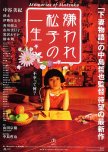
Memories of Matsuko is the lovechild of Confessions, Kamikaze Girls and The World of Kanako. When it comes to visuals, it comes close to Girls, the down spiral storytelling is reminiscent of Confessions, while the almost poetic-nihilism sounds like Kanako. But the film stands at its own.
I'd say, Memories of Matsuko is probably the most visually-appealing film that I've ever seen. Yes, it also resembles Amelie and Moulin Rouge. And to me, an alternate version of a Tim Burton film. I cannot emphasize enough just how beautiful this film looks. With heavy overtones, almost exaggerated, it always seems on edge—keeping us anticipated. And given its rather, tragic narrative, you can't help but not feel sentimental about it because of the way it's presented—at least visually.
This film is really that one that narrates it from beginning to the end. Not perfectly but never failing to highlight the important parts—and connect them as they go. Each one almost shown with immense beauty. Romanticized. Highlighted. Intensified. Because of this, despite Matsuko's struggles in life—it's done in a way that doesn't make it overly teleserye/soap-opera style drama but in a more, comical way.
That said, the film is indeed far from perfect. It's more than 2 hours run is exhausting especially since the narrative follows a pattern—she finds a man, falls in love/depends on him and then gets abandoned. In a moral sense, the film fails at showing us something strong. Yes, Matsuko is a strong character for having to endure such a life and to keep going. But in a way, it always make you question just how true is "It's all about giving than receiving."
You see, how can you keep giving, unconditionally without receiving what you deserve? How can you put up with shitty men who use you, betray you and leave you and be okay with it? Instead of showing us that we should depend on others for our happiness and survival, why can't we depend on ourselves, if after all, all we have is our self? What is wrong with being alone? What is the fear and the shame in that when every one who we tried to accept in our lives, just ends up stepping over us?
I mean, in the end, Matsuko retreats to her world...but if she decided so, why couldn't she have made that opportunity in to a positive one, at least for herself? Does she think so little for herself? Does she think it's all about giving another person love unconditionally but not yourself? Isn't that more toxic than being alone?
That is my primary issue with the film. In a way, it shows us that as long as we love others, then what, we can die happily? Don't glorify death like that as if she actually lived a happy life. In a way, it's extreme normalizing and telling us that the only way to be happy is—to be with a man.
Of course not.
So, to answer her constant, Why
Matsuko, darling, it's simply because all you have to do is love yourself. You prefer solitude, withdrawal, hikokomori? Sure. Go ahead. But at least you love yourself.
But the visual really took my breathe away and I can't deny that despite its sloppy narrative and storytelling, I did enjoy that film. But I'm acknowledging that this isn't a perfect film. If you look past the moral sense (and just enjoy it as a film by itself, I didn't because I had to analyze the film for my film class) then yes, this is great.
Was this review helpful to you?

Of course, it's seen in the two main characters, Kim Jung Yeon and Kim Seong Geun. Both of whom are also escaping two different things. While male Kim's is more evident, female Kim's is not explicitly told. But that's fine. A hikikomori's reason for shutting himself/herself in has a very long list of reasons and perhaps even the hikikomoris themselves do not know the definitive one. But one thing is clear: escape and withdrawal.
We see how both characters try to live as normally as they can. Male Kim adjusts to the island life in just three months and with only a scarecrow as his companion (a symbol of his old self), he looks more lively than he did 5 months ago. Female Kim lives virtually, by having a virtual identity, she feels "connected" with the world and tries to live normally by doing normal things like as she said, go to "work" and exercise.
Here, we see how human connection tries to render boundaries useless. They break down the walls we have build once we have reach an understanding and to these two is began with the noodles. The noodles becomes a symbol of hope for the two lonely characters. And eventually, it's also each other that in the end, they long to see.
As cheesy and sentimental as this sounds, Castaway wants to show the light at the end of the tunnel. That through hardships, we can retreat to our own worlds but eventually, we will emerge, good as new. It's not a dead end.
Was this review helpful to you?
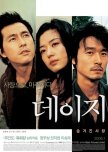
What drew me to watch "Daisy" is 3 things: Jun Ji-Hyun (also known as Gianna Jun), the intriguing plot and the title, having a friend named the same.
The plot is very drama-worthy and for some reason, its 110 minutes running time felt very short and unbalanced. At times, there is a voice-over by Hyun, at times by either of the two male leads. I didn't really like this approach because it's telling more than showing.
Set in Amsterdam, the setting is very beautiful. With shots from the city, from the countryside and from indoors. What I do admire about "Daisy" is its simplicity. The narrative is certainly simple and easy to follow.
But the way it's edited is overdramatic especially in scenes that don't require it. Over use of fades out may be refreshing but it just doesn't work. And that awkward fade-to-black as if to create dramatic suspense also doesn't work.
That said, the soundtrack is beautiful. The acting was great. It felt very sentimental and I think the cast pushed through. I enjoyed watching but it felt to really tug at you, which for a story like this, would have done well.
Was this review helpful to you?

How accurate is the historical portrayal here? I cannot say for sure. But I do think that the initial plot of having a simple man pretend to be king is nothing out of the ordinary but one that's deeply fascinating to see especially if the difference between the imposer and the real one is huge. Byung-hun mere change of tone and way of speaking already had me so impressed. I absolutely did not expect comedy to be in a historical film like this and that caught me by surprise.
Was it weird? No. Because it worked. Did it work well with the drama? It did. It was able to show the change and characterization and ultimately, the actor's acting ability.
It is a fun watch as much as it is a dramatic watch. Ultimately, what kept me glued isn't the plot but it's the character. The visuals are stunning. The ambiance, the setting, down to the little details of the clothes, the hair, the scroll -- everything is so beautiful to look at. Not to mention the music framing, especially when Byung-hun is giving his speech. Perfect. With matching feels. Not to mention the incredible supporting cast including Han Hyo-joo, Ryu Seung-ryong, Jang Gwang and Kim In-kwon that creates a grand ensemble.
Masquerade (as I've heard) as a 100% rating in Rotten Tomatoes, 6th highest-grossing film in the industry and sweeping the 49th Grand Bell Awards, this film woos you. I laughed, I (almost) cried, I felt the subtle romance and I felt the feels.
Was this review helpful to you?
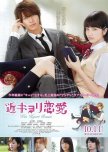
I've seen Yamapi in his latest drama, From 5 to 9 and I wanted to see his acting abilities. But just like his character in that drama, Yamapi feels like a #deadfisheye actor. (I read in a Psycho-Drama article, there's agood analysis of his acting in his other works there as well.) He is good-looking, yes. (And his character in that drama requires for him to have that type of acting but after seeing it here too...) And he has the charisma but his acting just doesn't feel real.
Nana Komatsu on the other hand basically swept him under the rug. I've just seen her in The World of Kanako and she is amazing. Her character here is suppose to the one who puts on the ultimate poker face (which she is able to do really well by the way) and Yamapi is suppose to be the one to complement that character by contrasting with her, yet he probably chooses to have a poker face/deadfisheye battle with her.
Plot wise, it's nothing new. Teacher-student relationships are common in anime and manga. Is it done right here? Well, I can't say for sure. I just think that there's not enough development and scene for the two to make their relationship and feelings believable or sincere. Yes, they have chemistry. But it just lacks the development for it to feel like it's done right. We also don't know why Komatsu's character is the way she is. And why Sensei chooses to give her private lessons. There are a lot of gaps here which is why I truly didn't have much of the *doki doki* feelings.
Side note: Also technically, even if Komatsu's character is 18 years old (the legal age in most countries), you're considered an adult at 20 in Japan and they even have a ceremony for it.
Was this review helpful to you?

When a Wolf Falls in Love With a Sheep
1 people found this review helpful
The Plot/Setting:
Honestly, I love how the movie began with a montage of happy moments of Tung and Ying's relationship and yet quickly moved on to the main conflict of the story: Ying left Tung through a post-it note that says "I'm off to cram school." I love how that started off because it didn't have to go through a lot of nonsense scenes and just already started off with the story's conflict and well, let the story develop from there. Like I said earlier, there's nothing grand with the movie's plot. In fact, it's a simple love story. The partner left the other partner and then we'll witness how the one who got left behind handles this. And because of that simple story, I think the movie is able to tug at heartstrings of film watchers like me who have a certain weakness of simple concepts of plots like this yet presentation wise is able to stretch the film to greater heights.
I love the setting of the movie. It gave that typical "Taipei" feel even if I haven't been to Taipei. Anyway, the setting of the movie is in the famous "cram school" area. And the film is really able to give of that feel. I love how the connections of characters intertwine in the movie. Watching this movie gives the audience a sense of lightness because it doesn't dwell too heavily on the problems, it's not too edgy to begin with. It doesn't drag your dramatic emotions down because it does have that twinge of sadness yet balances it well with the positive aura and comedic elements of the film. I guess being a student and the rise of cram school (or called tutorial centers here) popularity kind of makes me relate to the story. And that's the thing, the story is relatable because it's about MOVING ON. I think the pacing was good and it was able to build on and explore the relationship and experiences of the character.
The Characters/Acting:
I really really love Kai Ko's performance in You're the Apple of My Eye and I loved him more because of When a Wolf Falls in Love with a Sheep. I think Kai Ko as an actor gives the audience a lighthearted feel because of his jolly and fun nature not only because of his character but as an actor as well. I think that he's always able to portray a frustrated character fairly well and develop throughout the story. As for his character, Tung I really really love how he grows and matures and thinks outside of the box in the movie. I like how how he finally overcame the departure of Ying in his life. His job, a photocopy/delivery guy also symbolizes the fact that he gives back items to the people who left them to remind them of their past highlights how we should move on but we also shouldn't abandon our past because we wouldn't be the person we are today because of it. Man-shu's acting is also great, she knows how to act like an awkward character and yet doesn't fail to shine as well. I think that the simplicity of her character also allows her to develop more in the story. Other secondary characters were also given a fair share of their own spotlight.
The Romance:
If there's one thing to say about the romance it, it's not heavy. Actually, it's more of the getting-to-know-you stage of a love story rather than the getting-into-a-relationship love story. We have two people who are brought together because of being left by their previous partners and we see how they both handle the things differently. There's nothing grand about their love story and that's why I like about it. Kai Ko and Man-shu's chemistry is really seen in the screen and their interactions are both fun and serious, not to mention their damn metaphors of paper planes and counting 1-100 or those drawings of a sheep and a wolf.
The Cinematography:
I think that the cinematography is beautiful. I love the combinations of time-warped-slow motions and animations that blend in well with the atmosphere of the film. I love the vibrancy of the colors, it's not too strong it gives a sense of lightness and thus, doesn't make the film look heavy. It's a relaxing sight to see. I think that the scene where students fly the paper planes was really beautiful and I love how it was shot. I love how there was really emphasis on important objects and how the film was able to combine close-ups and long shots together and make it blend well.
The Theme/Message:
Move on. That's the film's central message. You see, Tung is so busy looking for Ying that he didn't realize what he's actually looking for is just Yang. The film tries to show us not to be too caught up in the past, yet we have to keep moving forward and along the way we'll meet someone new. The idea of flight, of freedom and of moving on with the metaphors of the paper planes, the counting of 1-100, the memories of the items that people left behind all highlight this fact.
The Final Verdict:
Overall speaking, When a Wolf Falls in Love with a Sheep is a lighthearted romance with beautiful cinematography and simple plot. Yet it able to deliver a definite message, there's a variety of fun characters and it's a relaxing watch on a raining afternoon combined with coffee.
Was this review helpful to you?
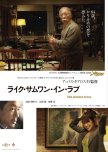
But "Like Someone in Love" opens powerfully. Perhaps it will leave you confused but it already reinforces what we need to know. There is a woman speaking but we do not know who she is. That goes for more about a minute or two. And when we are finally shown who she is, she, alone is in the frame—almost like she's trapped.
And throughout the film, that's what we're shown. A trapped Akiko.
About 20 minutes in, I was already sobbing.
Akiko trapped in the taxi, with neon lights flashing through her face, some reflected on the window, makes her seem like she is lost—discovering the world outside for the first time, wandering through flashy lights and busy streets, trapped while listening to voice messages left by her grandmother who longs to meet her.
And that's what made me start shedding tears. The grandma's messages. The voice. The calmness. But at the same time, the longing to meet her granddaughter. And when the taxi finally puts the grandmother in view, waiting next to a statue, the camera choses to push us away, never showing her in close-up. Akiko, arches her head, asks the driver to turn one more, getting as much as she can. And drives away.
I am helpless as she was. I wanted to do something. As Akiko arches her head, she is filled with struggle, wanting to escape the taxi, acting like her prison but she knows she can't. And drives on.
It made me angry though, how much we take for granted the people that love us and care for us, who despite their age, wait for us, travelled to Tokyo, made an effort to call us, only for us, to leave and give up. Only when we lose these people do we realize the importance of that. That scene is powerful in the movie but it is also powerful for me—having lost my own grandma only a year ago. It resonated so much, it felt me in tears.
"I'll be waiting," her grandma says.
At least she has a grandma waiting for her. And she took it for grandma. (This is me being sentimental, sorry.)
The car will then become a symbol of Akiko's prison. Later, she sits inside Takeshi's Volvo. As I said, I'm not familiar with Kiarostami's works but he seems to focus a lot on identity, lies and deceit. And truth be told, he does it subtly here, almost nestled in so smoothly, you won't be able to say the film focuses on that.
Akiko is deceiving her jealously boyfriend and her grandma about her profession as a callgirl. Takeshi, the old man that she meets at night, pretends to be her grandfather the next day. Her jealous boyfriend says he is ready for marriage but seems not to be.
These little things are hidden so well in the dialogues. The film also focuses on close-up as a means to show the characters' lies and deceit. Cleverly done through the lack of an actual score as well, it makes you feel like a real observer—only you are helpless to do anything.
1hr45 minutes feel short. And the ending is abrupt, almost unfinished and lacking but ultimately, "Like Someone in Love" succeeds in delivering what it needs to. Perhaps its slow past is difficult to get through (it was for me), it's a beautiful film but a film that's also difficult to recommend.
Was this review helpful to you?
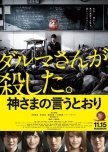
Truth be told I did watch this because of Fukushi Sota, although it has an interesting and intriguing story. Japanese films are known for either its love stories, action and horror. Well, As the Gods Will being based on a manga, surprisingly is quite refreshing. Although the initial concept of teenagers fighting against each other for survival isn't new (Battle Royale/The Hunger Games), the idea of using children's games as a mean for the plot to take place is interesting and ironic at the same time.
While the movie has its fair share of gripping scenes, sometimes so violent that I had to avert my eyes, it's still one of the those films that have its typical tropes. Exhibit A: that one sadistic student that everyone should be wary of. Some cheesy out-of-nowhere lined romance (I get the purpose but really though...) and the fact that there wasn't much background to begin with left the story hanging, though it makes everything open-ended. I did love how it also took some risks...that surprised me.
As for the characters...they lack depth. I know it's a survival movie and we don't have time for that but in order to root for someone or at least feel a connection with the people who are fighting to live, we must at least get to know them. Fukushi Sota is such an eye-candy but his acting is still so mediocre. I did think that the actor who played the sadistic student was better. The CGI was okay...wasn't top-notch but wasn't too bad as well.
All in all, I think it's still an entertaining watch.
Was this review helpful to you?

